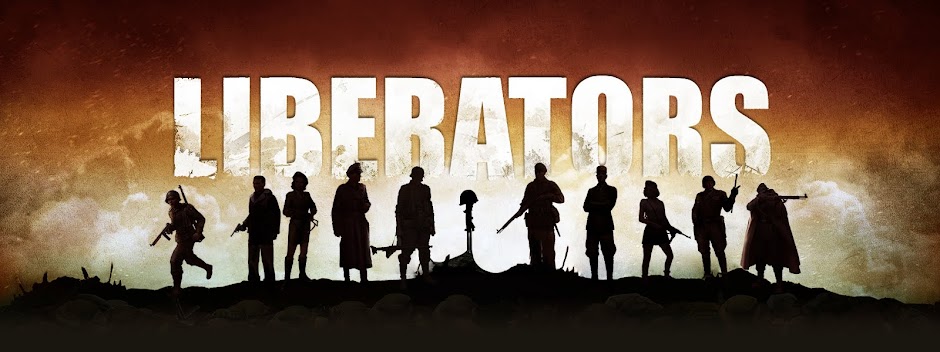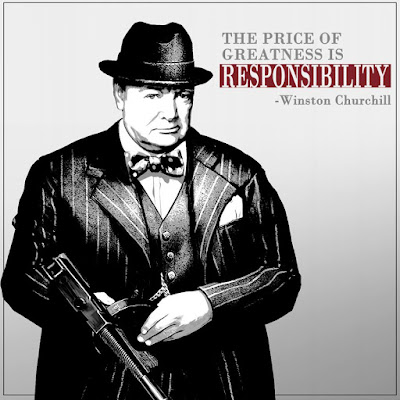Liberators features historical World War 2 commanders. "No crime is so great as daring to excel." Few people have done more for British morale during World War II than in Prime Minister wartime Sir Winston Churchill. A natural leader, he was able to forge alliances, make preparations, and save countless lives. By combining its making first-class decision rhetorical exemplary skills, he brought Britain to the brink of defeat all the way to victory.
Sir Winston Leonard Spencer-Churchill, KG, OM, CH, TD, PC, DL, FRS, RA (November 30, 1874 - January 24, 1965) was a British statesman who was the UK prime minister from 1940 to 1945 and again from 1951 to 1955. Churchill was also an officer in the British army, a historian, a writer (as Winston S. Churchill), and an artist. He won the Nobel Prize for Literature, and was the first person to be made an honorary citizen of the United States.
Churchill was born into the family of the Dukes of Marlborough, a branch of the Spencer family. His father, Lord Randolph Churchill, was a charismatic politician who served as finance minister; his mother, Jennie Jerome, was an American socialite. As a young army officer, he saw action in British India, the Sudan and the Second Boer War. He gained fame as a war correspondent and wrote books about his campaigns.
At the forefront of politics for fifty years, he held several political offices and cabinet. Before the First World War, he served as Chairman of the Board of Trade, Home Secretary and First Lord of the Admiralty as part of the liberal Asquith government. During the war he continued as First Lord of the Admiralty until the disastrous Gallipoli Campaign caused his departure from the government. He then briefly resumed active service on the Western Front as commander of the 6th Battalion of The Royal Scots Fusiliers. He returned to government under Lloyd George as Minister of Munitions, Secretary of State for War, Air Secretary of State, then Secretary of State for the Colonies. After two years out of Parliament, he served as finance minister in the conservative government of Baldwin 1924-1929, controversially returning the pound sterling in 1925 to the gold standard at its pre-war parity, one widely seen as a move creating a deflationary pressure on the UK economy.
Out of the office and politically "in the wilderness" during the 1930s because of his opposition to increased home rule for India and its resistance to 1936 abdication of Edward VIII, Churchill took the lead in warning about Nazi Germany and campaign for rearmament. With the outbreak of World War II, he was again appointed First Lord of the Admiralty. Neville Chamberlain's resignation in the following May 10, 1940, Churchill became Prime Minister. His speeches and radio broadcasts helped inspire British resistance, especially during the difficult days of 1940-1, when the British Commonwealth and Empire were almost alone in its active opposition to Adolf Hitler. He led Britain as Prime Minister until the victory over Nazi Germany had been secured.
After the Conservative Party lost the 1945 election, he became Leader of the Opposition to the Government Office. He publicly warned of an "Iron Curtain" of Soviet influence in Europe and promoted European unity. After winning the election in 1951, Churchill again became prime minister. His second term was concerned about foreign affairs, including the Malayan Emergency, Mau Mau Uprising, the Korean War, and a UK-backed coup in Iran. Internally their government placed great emphasis on building houses. Churchill suffered a serious stroke in 1953 and retired as prime minister in 1955, although he remained a member of parliament until 1964. After his death at ninety, in 1965, Elizabeth II awarded him the honor of a state funeral which saw one of the largest assemblies of world statesmen in history. Named the most British of all time in a 2002 Churchill's research it is widely regarded as being among the most influential people in British history, consistently ranking well in opinion polls UK prime ministers.
Churchill was an accomplished artist and took great pleasure in painting, especially after his resignation as First Lord of the Admiralty in 1915. He found a haven in art to overcome periods of depression he suffered throughout his life. As William Rees-Mogg said: "In his own life, he had to suffer the" black dog "of depression in his landscapes and still lives there is no sign of depression.." Churchill was persuaded and taught to paint by his artist friend, Paul Maze, whom he met during the First World War. Maze was a great influence on the painting of Churchill and became a fellow of painting throughout life.
Churchill is best known for his impressionist scenes of landscape, many of which were painted while on holiday in southern France, Egypt or Morocco. Using the pseudonym "Charles Morin," he continued his hobby throughout his life and painted hundreds of pictures, many of which are on display in the studio at Chartwell as well as private collections. Most of his paintings are oil-based and feature landscapes, but he also made a series of interior scenes and portraits. In 1925, Lord Duveen, Kenneth Clark and Oswald Birley chose their winter sun as the winner of the prize in a contest for anonymous amateur artists. Due to obvious time constraints, Churchill attempted only one painting during World War II. He completed the Villa Taylor tower painting in Marrakech.
Some of his paintings can now be seen in the Wendy and Emery Reves Collection at the Dallas Museum of Art. Emery Reves was American publisher Churchill, as well as a great friend and Churchill often visited Emery and his wife in their villa, La Pausa, in southern France, which had originally been built in 1927 to Gabrielle "Coco" Chanel for her Bendor lover, 2nd Duke of Westminster. The villa was rebuilt inside the museum in 1985, with a Churchill painting gallery and souvenirs.
Despite his lifelong fame and upper-class origins Churchill always struggled to keep their income at a level that would fund his extravagant lifestyle. MPs before 1946 received only a nominal salary (and in fact did not receive anything until the Parliament Act 1911) that many had secondary professions from which to earn a living. Since his first book in 1898, until his second stint as Prime Minister, Churchill's income while out of the office it was almost entirely made from writing books and opinion articles for newspapers and magazines. The most famous of his newspaper articles are those that appeared in the Evening Standard from 1936 warning of the rise of Hitler and the danger of appeasement policy.
Churchill was also a prolific writer of books under the pseudonym "Winston S. Churchill," which he used in agreement with the American writer of the same name to avoid confusion between their works. Its production includes a novel, two biographies, three volumes of memoirs, and several histories. He was awarded the Nobel Prize for Literature in 1953 "for his mastery of historical and biographical description as well as for brilliant oratory in defending exalted human values". Two of his most famous works, published after his first premiership brought his international fame to new heights, were his memories of six-volume The Second World War and A History of the English Speaking Peoples; a story of four volumes covering the period from invasions of Britain (55 BC) Caesar to the beginning of World War I (1914). A number of volumes of Churchill's speeches were published. the first of which, for battle, was published in the United States under the title of blood, sweat and tears, and was included in the list of 100 notable books of 1924 to 1944 in Life Magazine.
Churchill was also an amateur bricklayer, construction of buildings and garden walls at his country home in Chartwell, where he also created butterflies. As part of this hobby Churchill joined the Amalgamated Union of Workers building trade, but was expelled because of his Conservative Party membership.
Play now on Liberators Facebook Fanpage to fight with Churchill in WW2 battlefields now!


No comments:
Post a Comment